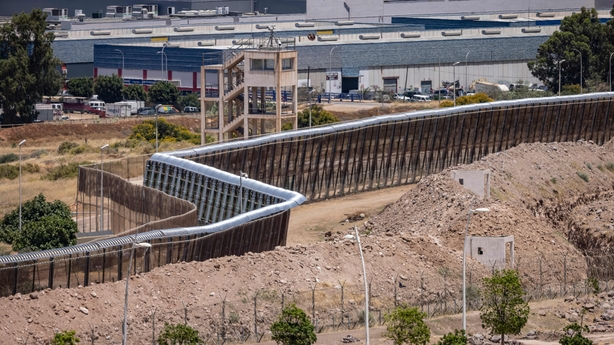Spain's ombudsman is to investigate the sinking of a dinghy headed to the Canary Islands from Morocco on Wednesday in which more than 30 migrants are feared dead.
Migration-focused organisations Walking Borders and Alarm Phone criticised Spain and Morocco for not intervening earlier to rescue the vessel's passengers.
Spain says all proper procedures were followed.
Walking Borders said the dinghy sank on Wednesday 64km off the African coast, 12 hours after the first requests for help were made.
The two groups said around 60 people were on board.
Two people, a child and a man, were found dead while 24 migrants were rescued by Morocco, Spain's maritime rescue service said.
The ombudsman is tasked with monitoring any possible breaches of civil liberties by the state and can make recommendations to parliament, while the government is constitutionally mandated to acknowledge and react to its reports.
At the time it sank, the dinghy was located in waters off Western Sahara.
Although Morocco administers a majority of the former Spanish colony, the area's sovereignty remains under dispute and the United Nations lists it as a non-self governing territory.
The migrant rights activists accuse Spain of failing in its duty of care because they say the dinghy was within the country's search-and-rescue region under international law, meaning Madrid should have led the operation instead of Rabat.
Although a Spanish rescue service ship, the Guardamar Caliope, was only 64km away from the dinghy on Tuesday evening, it had already rescued 63 people in a separate incident and authorities ordered it to return to port as several of them needed medical attention, Spain's Transport Ministry said.
The ministry statement said the maritime rescue service complied with international search and rescue procedures.
"At no time did the Moroccan authorities ask Spain's rescue service for assistance or mobilisation of resources, except in the final moments when the mobilisation of a helicopter was requested.
"The resources are always at the disposal of any emergency and this was no exception," a ministry source added.
Spain's ombudsman ruled last year ruled that the country failed to uphold domestic and international law in returning nearly 500 migrants to Morocco following a mass border crossing from Spain's North African enclave of Melilla last year in which at least 23 people died.

Amnesty International accused Spain and Morocco of a cover-up for failing to properly investigate what happened.
On 4 June 2022, around 2,000 people from Sub-Saharan Africa attempted to enter Melilla.
At least 37 died and at least 76 are still missing, the non-government organisation said.
Morocco said 23 people were killed in a crush when migrants fell from the fence.
Spain said no deaths occurred on its soil.
"One year on from the carnage at Melilla, Spanish and Moroccan authorities not only continue to deny any responsibility but are preventing attempts to find the truth," said Amnesty International's Secretary General, Agnes Callamard.
Amnesty said authorities had failed to make any attempt to repatriate victims' remains and had not provided a full list of names and causes of death, as well as CCTV footage which could inform an investigation.
"The lessons of Melilla must be learned or - as the shipwreck off the Greek coast shows - arbitrary loss of life, violence and impunity at borders will continue," Ms Callamard added.
A fishing boat packed with hundreds of migrants sank off Greece's southwest coast earlier this month, on a journey that started from Libya and was supposed to end in Italy.
At least 82 were killed and hundreds are missing.
Spain's Attorney General investigated the Melilla incident but declined to charge Spanish officers, who he said had been unaware of the fatal crush.
Spanish MPs rejected calls for a parliamentary inquiry.

